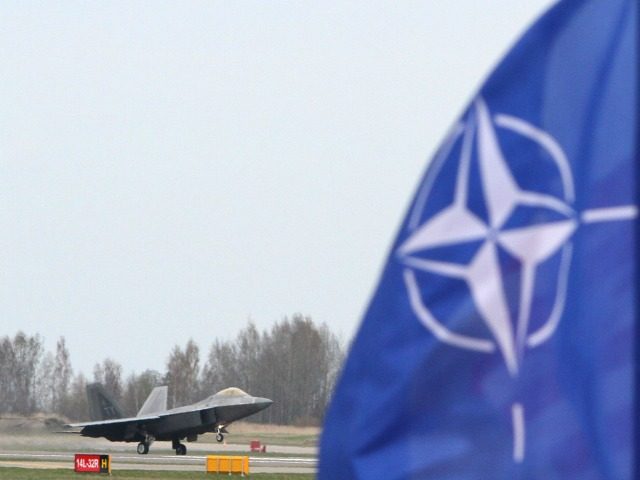For nearly three-quarters of a century, America’s erstwhile allies in Europe and Asia have gotten a free ride on the American defense train. But Islamic terrorism and Donald Trump may be changing all that.
A Pax Americana paid for by American taxpayers made economic sense at the end of the Second World War. After all, the economies of both Western Europe and Japan lay in ruins. The U.K. was effectively bankrupt.
The United States stood alone as the world’s powerhouse. Industrious Americans produced an incredible 50 percent of the world’s goods and services in 1945, as much as the rest of the globe combined.
Moreover, we were determined as a people to stop the Soviet Union from enslaving any more countries, and realized that we alone had the wherewithal to do so.
Flash forward 71 years. The economies of our allies have been humming along for the past half-century. Other countries, such as South Korea and Singapore, greatly aided by their easy access to the American market (and bad trade deals), joined their ranks at the same time.
The U.S. share of the world’s GDP has shrunk to 22 percent, while our allies have grown rich.
The world has changed, but we are caught in a kind of time warp. We continue to be stuck with a disproportionate share of the cost of our common defense, even as threats from both China and Russia are on the rise. For instance, the U.S. pays 73 per cent of the cost of NATO’s common defense, even though the combined GDP of our European allies is larger than ours.
So along comes Donald Trump, the businessman, and makes the perfectly reasonable suggestion that our allies should pay their fair share of our common defense.
Since many on the Left appear to have come completely unhinged at this modest proposal, it is well to reminds everyone what he actually said.
“My foreign policy will always put the interests of the American people, and American security, above all else,” said Trump on April 27th. “That will be the foundation of every decision that I will make. Our allies must contribute toward the financial, political and human costs of our tremendous security burden. But many of them are simply not doing so. They look at the United States as weak and forgiving and feel no obligation to honor their agreements with us.”
Nowhere does Trump imply—as Hillary Clinton has suggested–that he would end NATO, or encourage Japan and South Korea to go nuclear, or retreat into isolationism.
As far as the “free rider” problem is concerned, Trump’s criticism has been echoed by none other than Barack Obama, Bill Gates, and Bernie Sanders, although the President later tried to walk back his remarks after it became a campaign issue.
In fact, the practical consequence of negotiating a better deal with our erstwhile allies would clearly be to strengthen these alliances, not weaken them. Such a move would earn the respect of countries that now take the U.S. security umbrella for granted, and American taxpayers for chumps.
Such a move would also help to balance the federal budget, strengthen the U.S. economy, and stop the irresponsible piling of debt upon the shoulders of our children and grandchildren.
Trump gets this. “In this time of mounting debt, not one dollar can be wasted,” he has said.
Contrast this with the sentiment expressed in one of Clinton’s recently released e-mails. Confronted with China’s currency manipulation, she remarked, “I just hope they keep buying our debt!”
One of the obvious differences between the two presidential candidates is that one wants to save, while the other yearns to spend.
Those who accused Trump of “isolationism,” as Clinton has, or of “wanting to dismantle NATO,” could not have actually listened to his speech. If they had, they would have heard him say that “…only 4 of 28 other member countries, besides America, are spending the minimum required 2 percent of GDP on defense.”
Our allies need to be called out on this indefensible abandonment of their defense obligations. If all NATO members had been honoring their commitment, would Putin’s Russia have dared to take Crimea? Would it have launched a stealth invasion of eastern Ukraine? I doubt it.
Trump goes on to point out correctly that “We have spent trillions of dollars over time – on planes, missiles, ships, equipment – building up our military to provide a strong defense for Europe and Asia. The countries we are defending must pay for the cost of this defense – and, if not, the U.S. must be prepared to let these countries defend themselves. The whole world will be safer if our allies do their part to support our common defense and security.”
Does this sound like a man who wants to retreat from the world or, rather, like one who wants a better deal for the American people and knows how to get it?
As Trump has himself has said on numerous occasions, you cannot negotiate successfully if you are not prepared to leave the table. Reagan at Reykjavik understood this. So does Trump.
As Joseph Schmitz has recently pointed out, many of our NATO allies, like us, have recently suffered from attacks by jihadis, which will in all likelihood make them more interested in mounting a common defense. It will also make them more amenable towards meeting their NATO obligations.
Still, as long as we uncomplainingly pay the bills, they will be happy to continue to let us do so.
Trump is right. It is time for them to ante up.
Steven W. Mosher is the President of the Population Research Institute and the author of Hegemon; China’s Plan to Dominate Asia and the World.

COMMENTS
Please let us know if you're having issues with commenting.